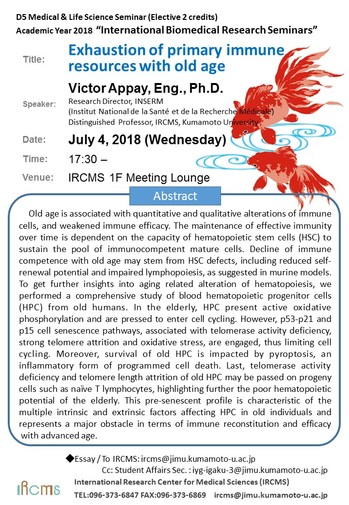- HOME
- News & Events
- [July 4]*D5 Medical & Life Science Seminar*
News & Events
[July 4]*D5 Medical & Life Science Seminar*
June 13 2018
The "D5 Medical & Life Science Seminar" course will be offered by International Research Center for Medical Sciences (IRCMS). It will run from May 2018 to March 2019, with lectures given by scientists affiliated or collaborated with the IRCMS. The course theme for this academic year is "Basic research for understanding disease mechanisms". The lectures will be given once a month, in English, and by leading scientists in the relevant research field. Students will be taught: 1) how normal physiological functions are maintained in human hematopoietic, vascular, immune, reproductive and nervous tissues and organs; 2) how abnormalities in these systems (e.g., cancer) are studied using experimental models; 3) cutting-edge technologies (including single cell level imaging and omics analysis) used for mechanistic understanding of these abnormalities; 4) efforts and progresses in finding cure for human diseases associated with these abnormalities; and 5) importance of understanding disease mechanisms using
Date: July 4, 2018 (Wed)
Time: 17:30 -
Venue: IRCMS 1F Meeting Lounge
Speaker: Victor Appay, Eng., Ph.D.
Abstract:
Old age is associated with quantitative and qualitative alterations of immune cells, and weakened immune efficacy. The maintenance of effective immunity over time is dependent on the capacity of hematopoietic stem cells (HSC) to sustain the pool of immunocompetent mature cells. Decline of immune competence with old age may stem from HSC defects, including reduced self-renewal potential and impaired lymphopoiesis, as suggested in murine models. To get further insights into aging related alteration of hematopoiesis, we performed a comprehensive study of blood hematopoietic progenitor cells (HPC) from old humans. In the elderly, HPC present active oxidative phosphorylation and are pressed to enter cell cycling. However, p53-p21 and p15 cell senescence pathways, associated with telomerase activity deficiency, strong telomere attrition and oxidative stress, are engaged, thus limiting cell cycling. Moreover, survival of old HPC is impacted by pyroptosis, an inflammatory form of programmed cell death. Last, telomerase activity deficiency and telomere length attrition of old HPC may be passed on progeny cells such as naïve T lymphocytes, highlighting further the poor hematopoietic potential of the elderly. This pre-senescent profile is characteristic of the multiple intrinsic and extrinsic factors affecting HPC in old individuals and represents a major obstacle in terms of immune reconstitution and efficacy with advanced age.

